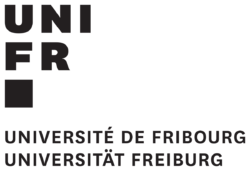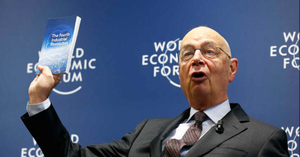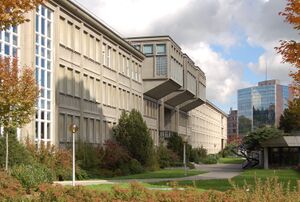University of Fribourg
(University) | |
|---|---|
 | |
| Motto | Scientia et Sapientia (Knowledge and Wisdom) |
| Formation | 1889 |
| Headquarters | Fribourg, Switzerland |
| Type | Public |
| Klaus Schwab's alma mater | |
The University of Fribourg (French: Université de Fribourg; German: Universität Freiburg) is a university in the city of Fribourg, Switzerland.[1]
The roots of the university can be traced back to 1580, when the notable Jesuit Peter Canisius founded the Collège Saint-Michel in the City of Fribourg.[2] In 1763, an Academy of law was founded by the state of Fribourg which formed the nucleus of the present Law Faculty.[3] The University of Fribourg was finally created in 1889 by an Act of the parliament of the Swiss Canton of Fribourg.[4][5]
The University of Fribourg is Switzerland's only bilingual university and offers full curricula in both French and German, two of Switzerland's national languages.[6] Students number about 10,000; there are about 200 tenured professors and 700 other academic teaching and research personnel.[7] The Misericorde Campus, constructed between 1939–42, was designed by the architects Honegger and Dumas, students of Swiss architect Le Corbusier.
There are five faculties: Catholic theology, law, natural sciences, humanities, and economics & social sciences.
Contents
History
The university owes its earliest origin to the foundation of the Jesuit College St. Michel on Belze Hill by Peter Canisius in 1580 at the invitation of the government of Fribourg. In 1763, an Academy of Law was founded, housed in the Albertinium (now a Dominican residence). In 1834, the cantonal library was formed from works brought to Fribourg (from Catholic monasteries) for safekeeping.[8] The College St. Michel was closed following the expulsion of the Jesuits from Fribourg after the canton's defeat in the Sonderbund war.[9]
In 1886, Georges Python, founder of the cantonal bank and State Counsellor for Fribourg (M.P. in the upper house of the Swiss parliament) became Director of Public Education. He raised funds through a lottery and was granted some 2,500,000 CHF by the canton. The cantonal library became integrated with that of the university and the Academy became the Faculty of Law. In 1939, the university moved to a new campus constructed on the former cemetery of Misericorde, ceding St. Michel to one of Fribourg's gymnasia, which took the name College St. Michel. During the Second World War, the university set up "university camps" along with the University of Zürich, HEC in St. Gall and a Lycée camp at Wetzikon provided a wide variety of courses to educate Polish prisoners of war.[10]
The Perolles campus was constructed on the site of a former wagon factory.[11]
Although many lectures were originally in Latin, Fribourg is now the only French/German bilingual university in the world (45% French and 55% German). The town itself is 70% French and 30% German. This fact, coupled with the traditional dominance of French as the language of the city aristocracy explains why French has remained so dominant in university administration and in the AGEF (Association Générale des Etudiants Fribourgois), the Student's Union. To commemorate the centenary of the university, La Poste issued a stamp depicting the figures Science and Sagesse.
Notable alumni and faculty

Politics
- Klaus Martin Schwab, German economist, the founder and executive chairman of the World Economic Forum
- Elijah Malok Aleng, former Deputy Governor of the Central Bank of Sudan and President of the Bank of Southern Sudan (2005–2011)
- Gerard Batliner, former Head of Government (Regierungschef) of Liechtenstein (1962–1970)
- Joseph Bech, Luxembourgian politician and 15th Prime Minister of Luxembourg
- Juan Carlos I, King of Spain
- Corina Casanova, Federal Chancellor of Switzerland 2008–2015
- Enrico Celio, President of the Swiss Confederation 1943, 1948
- Flavio Cotti, President of the Swiss Confederation 1991, 1998
- Joseph Deiss, Federal Chancellor 1999–2006, President of the Swiss Confederation 2004, President of the United Nations General Assembly 2010–11
- Kurt Furgler, President of the Swiss Confederation 1977, 1981 and 1985
- Martine Brunschwig Graf, Swiss politician, member of the Swiss National Council
- Otmar Hasler, Prime Minister of Liechtenstein 2001–09
- Hans Hürlimann, President of the Swiss Confederation 1979
- Arnold Koller, President of the Swiss Confederation 1990, 1997
- Giuseppe Lepori, Federal Chancellor and Consigliere del popolo (M.P.) for Ticino
- Richard Thomas McCormack, US Ambassador to the Organization of American States 1985–1989, US Under Secretary of State for Economic and Agricultural Affairs 1989–1991
- Ruth Metzler, Federal Chancellor, Member of the Swiss Federal Council 1999–2003, Vice President of the Swiss Confederation 2003
- Stanisław Mieroszewski, member of the Imperial Council of Austria
- Juli Minoves, Andorran ambassador, plenipotentiary, and political scientist
- Ignacy Mościcki, President of Poland 1926–1939
- Giuseppe Motta, Federal Chancellor (Swiss Cabinet member) 1911–40 (President of the Swiss Confederation 1915, '20, '27, '32, '37), President of the League of Nations 1924–25
- Jean-Marie Musy, Federal Chancellor, Member of the Swiss Federal Council
- Albert Pintat, head of the government of Andorra
- Bill Press, U.S. political commentator and former Chairman of the Democratic Party of California
- Simonetta Sommaruga, Member of the Swiss Federal Council 2010–present, President of the Swiss Confederation 2015
- Ludwig von Moos, President of the Swiss Confederation 1964, 1969
- Chaim Weizmann, first President of Israel
- Sérgio Vieira de Mello, UN High Commissioner for Human Rights 2002-2003 and UN Special Representative for Iraq 2003
Business and economics
- Jean-Marie Ayer, co-founder of Dartfish, Chairman and CEO 1999–2003
- Albert M. Baehny, Chief Executive Officer (CEO) of the Geberit Group since January 1, 2005
- Heinrich Burk, former CEO of ACNielsen
- Urs Felber, Swiss industrialist, philanthropist and design pioneer
- Stephan Klapproth, Swiss journalist and television presenter
- Adolphe Merkle, founder of Vibro-Meter International AG, Adolphe Merkle Foundation
- Marc Moret, former Chairman of Sandoz, uncle of Daniel Vasella's wife
- Arthur Dunkel (1932–2005), Swiss (Portuguese-born) administrator and a professor at the University of Fribourg; director-general of General Agreement on Tariffs and Trade, 1980–1993
Employee on Wikispooks
| Employee | Job | Appointed | End |
|---|---|---|---|
| Gerardo Broggini | Law Professor | 1956 | 1961 |
Alumni on Wikispooks
| Person | Born | Died | Nationality | Summary | Description |
|---|---|---|---|---|---|
| Gerardo Broggini | 16 November 1926 | 29 October 2018 | Switzerland | Lawyer | Swiss law professor and one of the pioneers of European legal integration. Attended Bilderberg/1965 |
| Flavio Cotti | 18 October 1939 | 16 December 2020 | Switzerland | Politician | Swiss politician who attended 4 Bilderbergs in the 1990s, when he led attempts to further Switzerland's political integration into the European Union. |
| Joseph Deiss | 18 January 1946 | Switzerland | Politician Economist | Economist and politician who was a Member of the Swiss Federal Council from 1999 to 2006. | |
| Kurt Furgler | 24 June 1924 | 23 July 2008 | Switzerland | Politician | President of Switzerland. 3 Bilderbergs, from 1970 to 1980. Wanted a strong central government and integration with the European Union. |
| Martina Hirayama | 1970 | Germany Switzerland | Politician Chemist | Swiss up-and-coming politician with a Bilderberg wind since 2019 | |
| Pierre Maudet | 6 March 1978 | Switzerland | Politician | Swiss WEF/YGL "prodigy" politician who wanted "interoperable" army with EU and NATO. Attended the 2015 Bilderberg | |
| Richard McCormack | 6 March 1941 | US | Spook Deep politician Businessperson | Deep politician a long history and connections back to Vietnam, Nixon administration, succeeded Ted Shackley as US Chair of Le Cercle. | |
| Ruth Metzler | 23 May 1964 | Switzerland | Politician | Member of the Swiss Federal Council from 1999 to 2003. Vice President of Switzerland 1 January 2003-31 December 2003. WEF/Global Leaders for Tomorrow/2002 | |
| Felicien Morel | 4 March 1935 | Switzerland | Politician | Swiss Bilderberg politician | |
| Susanne Ruoff | 29 September 1958 | Switzerland | Businessperson | CEO of Swiss Post 2011-2018. Attended the 2017 Bilderberg Conference. | |
| Antonin Scalia | 11 March 1936 | 13 February 2016 | US | Judge | US judge |
| Klaus Schwab | 30 March 1938 | Germany | Academic Economist Deep state actor | German economist, Bilderberg Steering committee, World Economic Forum Board of Trustees | |
| Chaim Weizmann | 27 November 1874 | 9 November 1952 | Israel UK | Politician Chemist | President of Israel 1949-1952 |
References
- ↑ http://www.llm-guide.com/university/776/fribourg-university-law-faculty
- ↑ http://www.dailycatholic.org/apr27doc.htm%7Cwebsite=www.dailycatholic.org
- ↑ http://www.newadvent.org/cathen/06302a.htm
- ↑ http://www.universitieshandbook.com/directory/canton-fribourg/university-of-fribourg
- ↑ https://www.fr.ch/safu/fr/pub/universite_fribourg.htm
- ↑ http://fr.mastersportal.eu/universities/815/universitat-freiburg-universite-de-fribourg.html
- ↑ http://globaled.gmu.edu/programs/semester/switzerland.html
- ↑ https://web.archive.org/web/20180914022906/http://www.sellamquick.com/fr/classified_ads/university-of-business-and-international-2/
- ↑ http://www.newadvent.org/cathen/06302a.htm%7Ctitle=University of Fribourg (Switzerland)
- ↑ http://www.polandinexile.com/franceand2dsp.html
- ↑ https://web.archive.org/web/20160304040731/http://www.fribourgtourisme.ch/en/uni-misericorde.html
